【英语】情态动词详解+例句
情态动词总结
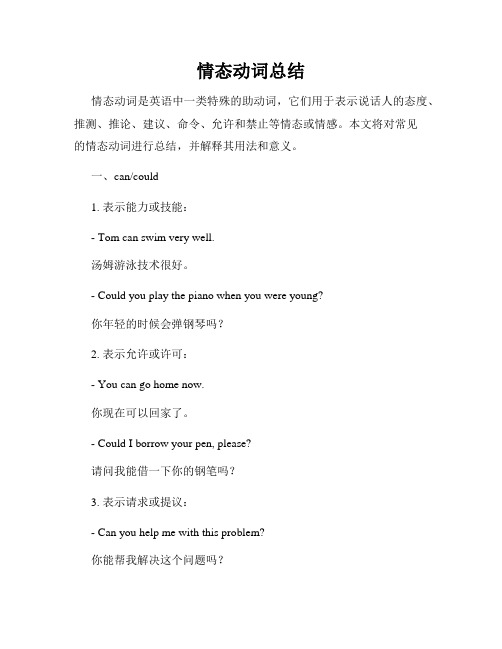
情态动词总结情态动词是英语中一类特殊的助动词,它们用于表示说话人的态度、推测、推论、建议、命令、允许和禁止等情态或情感。
本文将对常见的情态动词进行总结,并解释其用法和意义。
一、can/could1. 表示能力或技能:- Tom can swim very well.汤姆游泳技术很好。
- Could you play the piano when you were young?你年轻的时候会弹钢琴吗?2. 表示允许或许可:- You can go home now.你现在可以回家了。
- Could I borrow your pen, please?请问我能借一下你的钢笔吗?3. 表示请求或提议:- Can you help me with this problem?你能帮我解决这个问题吗?- Could we have lunch together tomorrow?明天我们一起吃午饭好吗?4. 表示推测或猜测:- It can't be true! I don't believe it.这不可能是真的!我不相信。
- They could be at the park. Let's check there.他们可能在公园。
我们去看看吧。
二、may/might1. 表示允许或许可:- May I use your phone?我可以用你的手机吗?- Might I have another piece of cake?我可以再要一块蛋糕吗?2. 表示请求或建议:- May I ask you a question?我可以问你一个问题吗?- You may consider taking a break.你可以考虑休息一下。
3. 表示推测或猜测:- She may be late for the meeting.她可能会迟到开会。
- It might rain tomorrow, so bring an umbrella.明天可能会下雨,所以带把伞吧。
情态动词的用法
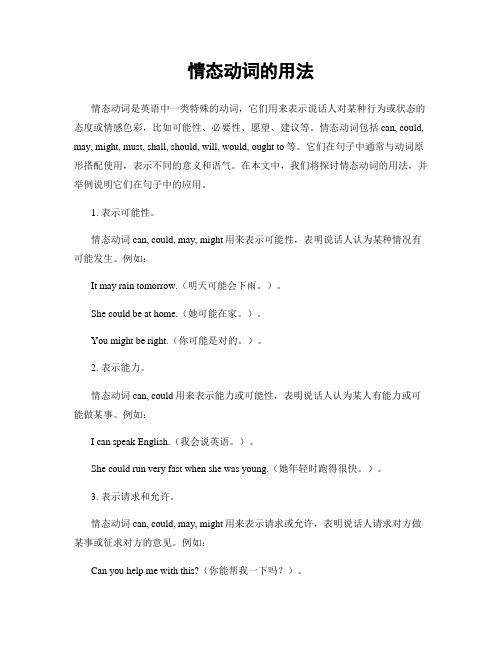
情态动词的用法情态动词是英语中一类特殊的动词,它们用来表示说话人对某种行为或状态的态度或情感色彩,比如可能性、必要性、愿望、建议等。
情态动词包括can, could, may, might, must, shall, should, will, would, ought to等。
它们在句子中通常与动词原形搭配使用,表示不同的意义和语气。
在本文中,我们将探讨情态动词的用法,并举例说明它们在句子中的应用。
1. 表示可能性。
情态动词can, could, may, might用来表示可能性,表明说话人认为某种情况有可能发生。
例如:It may rain tomorrow.(明天可能会下雨。
)。
She could be at home.(她可能在家。
)。
You might be right.(你可能是对的。
)。
2. 表示能力。
情态动词can, could用来表示能力或可能性,表明说话人认为某人有能力或可能做某事。
例如:I can speak English.(我会说英语。
)。
She could run very fast when she was young.(她年轻时跑得很快。
)。
3. 表示请求和允许。
情态动词can, could, may, might用来表示请求或允许,表明说话人请求对方做某事或征求对方的意见。
例如:Can you help me with this?(你能帮我一下吗?)。
Could I use your pen?(我可以用一下你的笔吗?)。
May I come in?(我可以进来吗?)。
4. 表示必要性。
情态动词must, should, ought to用来表示必要性或建议,表明说话人认为某种行为是必要的或值得做的。
例如:You must finish your homework before you go out to play.(你必须在出去玩之前完成作业。
)。
You should apologize to her.(你应该向她道歉。
14个情态动词及其用法

14个情态动词及其用法14个情态动词及其用法如下:1.can:表示能力,用于疑问句或否定句中表示惊异、怀疑、不相信等态度。
如:Can you speak English?你会说英语吗?2.could:表示过去的能力或可能性。
表示惊异、怀疑、不相信等态度时,可用could。
如:Could you have done this?你真的能做到这个吗?3.may:表示可能性。
用于请求、允许、祝愿等场合。
如:May I borr ow your book?我能借你的书吗?4.might:表示可能性,比may更委婉。
如:Might I have your attenti on,请大家注意。
5.must:表示肯定、确定,用于陈述事实或推测。
如:The game must be over,比赛应该结束了。
6.need:表示需要、必要性。
如:We need to finish this task today。
我们今天需要完成这个任务。
7.ought to:表示应该、应当,用于表示道义上的责任或推测。
如:Yo u ought to help him,你应当帮助他。
8.dare:表示勇气、敢。
如:Dare you jump off the bridge?你敢从桥上跳下去吗?9.shall:表示询问、承诺、威胁等。
如:Shall we start?我们开始吗?10.will:表示将来、意愿、决心等。
如:I will finish this work on ti me.我会按时完成这个工作。
11.had better:表示建议、警告。
如:You had better hurry,你最好快点。
12.have to:表示被迫、必须。
如:I have to go to work,我必须去上班。
ed to:表示过去经常发生的动作或状态,也可表示习惯或倾向。
如:He used to smoke,他过去经常抽烟。
14.shouldn't:表示不应该,用于否定句中表示建议、批评等。
情态动词及例句
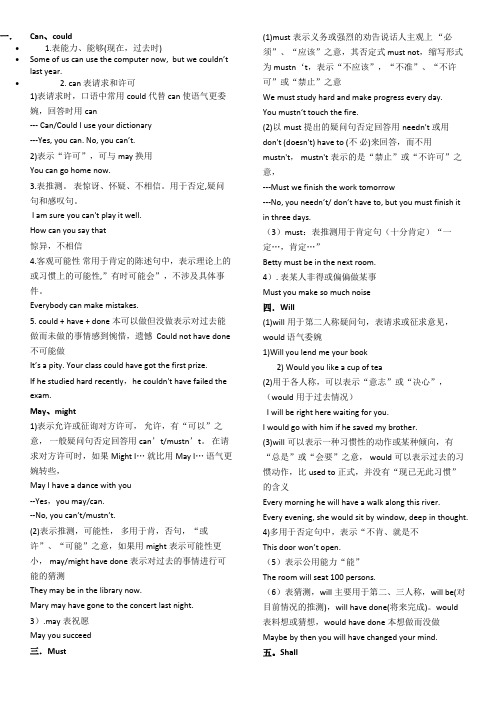
一.Can、could• 1.表能力、能够(现在,过去时)•Some of us can use the computer now, but we couldn’t last year.• 2. can 表请求和许可1)表请求时,口语中常用could 代替 can 使语气更委婉,回答时用can--- Can/Could I use your dictionary---Yes, you can. No, you can’t.2)表示“许可”,可与may 换用You can go home now.3.表推测。
表惊讶、怀疑、不相信。
用于否定,疑问句和感叹句。
I am sure you can't play it well.How can you say that惊异,不相信4.客观可能性常用于肯定的陈述句中,表示理论上的或习惯上的可能性,”有时可能会”,不涉及具体事件。
Everybody can make mistakes.5. could + have + done 本可以做但没做表示对过去能做而未做的事情感到惋惜,遗憾 Could not have done 不可能做It’s a pity. Your class could have got the first prize.If he studied hard recently,he couldn't have failed the exam.May、might1)表示允许或征询对方许可,允许,有“可以”之意,一般疑问句否定回答用can’t/mustn’t。
在请求对方许可时,如果Might I…就比用May I…语气更婉转些,May I have a dance with you--Yes,you may/can.--No, you can’t/mustn’t.(2)表示推测,可能性,多用于肯,否句,“或许”、“可能”之意,如果用might表示可能性更小, may/might have done 表示对过去的事情进行可能的猜测They may be in the library now.Mary may have gone to the concert last night.3).may表祝愿May you succeed三.Must (1)must表示义务或强烈的劝告说话人主观上“必须”、“应该”之意,其否定式 must not,缩写形式为 mustn‘t,表示“不应该”,“不准”、“不许可”或“禁止”之意We must study hard and make progress every day.You mustn‘t touch the fire.(2)以must提出的疑问句否定回答用needn't或用don't (doesn't) have to (不必)来回答,而不用mustn't, mustn't表示的是“禁止”或“不许可”之意,---Must we finish the work tomorrow---No, you needn’t/ don’t have to, but you must finish it in three days.(3)must:表推测用于肯定句(十分肯定)“一定…,肯定…”Betty must be in the next room.4). 表某人非得或偏偏做某事Must you make so much noise四.Will(1)will用于第二人称疑问句,表请求或征求意见,would 语气委婉1)Will you lend me your book2) Would you like a cup of tea(2)用于各人称,可以表示“意志”或“决心”,(would用于过去情况)I will be right here waiting for you.I would go with him if he saved my brother.(3)will可以表示一种习惯性的动作或某种倾向,有“总是”或“会要”之意, would可以表示过去的习惯动作,比used to正式,并没有“现已无此习惯”的含义Every morning he will have a walk along this river. Every evening, she would sit by window, deep in thought.4)多用于否定句中,表示“不肯、就是不This door won’t open.(5)表示公用能力“能”The room will seat 100 persons.(6)表猜测,will主要用于第二、三人称,will be(对目前情况的推测),will have done(将来完成)。
人教版七年级下册英语之情态动词的例句解析

人教版七年级下册英语之情态动词的例句解析本文将为您提供人教版七年级下册英语中情态动词的例句解析。
请注意,情态动词用来表示说话人的态度、推测、能力等,且不能单独作谓语。
以下是一些常见的情态动词及其例句解析:1. Can- I can swim.(我会游泳。
)- Can you help me?(你能帮助我吗?)2. Could- Could you pass me the salt, please?(请你递给我盐好吗?)- They could run fast when they were young.(他们小时候跑得很快。
)3. May- May I use your phone?(我可以用一下你的手机吗?)- It may rain tomorrow.(明天可能会下雨。
)4. Might- He might be late for the meeting.(他可能会迟到开会。
)- I might go to the party if I finish my work early.(如果我早完工了可能会去参加派对。
)5. Shall- Shall we go out for dinner tonight?(我们今晚出去吃饭好吗?)- Shall I help you with your homework?(我帮你做作业好吗?)6. Should- You should eat more fruits and vegetables.(你应该多吃水果和蔬菜。
)- We should study for the exam.(我们应该为考试而研究。
)7. Must- I must finish my project before the deadline.(我必须在截止日期之前完成我的项目。
)- You must wear a seatbelt in the car.(你在车里必须系安全带。
)以上是情态动词的一些例句解析,希望对您有帮助。
情态动词的用法与常见短语

情态动词的用法与常见短语情态动词是英语中一类特殊的动词形式,用于表达说话人对某种行为或状态的态度、意愿、能力、可能性、必要性等。
情态动词常常与其他动词一起构成句子的谓语部分,从而表达出更准确、更细致的意思。
本文将详细介绍情态动词的用法,并列举一些常见的情态动词短语,帮助读者更好地理解和运用情态动词。
一、情态动词的基本用法1. 表示能力和能够:can, could, be able to- She can swim very well.(她游泳技术非常好。
)- I could play the piano when I was young.(我小时候会弹钢琴。
) - He will be able to finish the project on time.(他有能力按时完成这个项目。
)2. 表示许可和能力:may, might, could- May I ask you a question?(我可以问你一个问题吗?)- You might be right.(你可能是对的。
)- Could I borrow your pen, please?(我能借用你的笔吗?)3. 表示推测和可能性:may, might, could- He may come to the party tonight.(他可能今晚来参加派对。
) - It might rain tomorrow.(明天可能会下雨。
)- The train could be late.(火车可能会晚点。
)4. 表示建议和义务:should, ought to, had better- You should apologize to her.(你应该向她道歉。
)- We ought to help those in need.(我们应该帮助有需要的人。
) - You'd better take an umbrella with you.(你最好带把伞。
情态动词的用法总结及例句解析
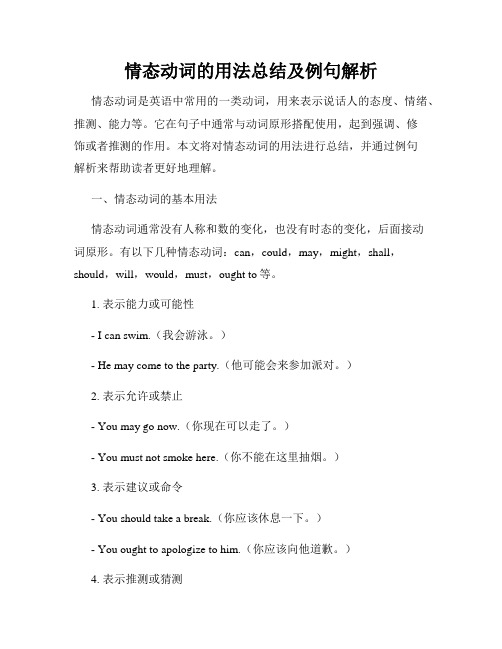
情态动词的用法总结及例句解析情态动词是英语中常用的一类动词,用来表示说话人的态度、情绪、推测、能力等。
它在句子中通常与动词原形搭配使用,起到强调、修饰或者推测的作用。
本文将对情态动词的用法进行总结,并通过例句解析来帮助读者更好地理解。
一、情态动词的基本用法情态动词通常没有人称和数的变化,也没有时态的变化,后面接动词原形。
有以下几种情态动词:can,could,may,might,shall,should,will,would,must,ought to等。
1. 表示能力或可能性- I can swim.(我会游泳。
)- He may come to the party.(他可能会来参加派对。
)2. 表示允许或禁止- You may go now.(你现在可以走了。
)- You must not smoke here.(你不能在这里抽烟。
)3. 表示建议或命令- You should take a break.(你应该休息一下。
)- You ought to apologize to him.(你应该向他道歉。
)4. 表示推测或猜测- He could be there.(他可能在那里。
)- It might rain tomorrow.(明天可能会下雨。
)5. 表示义务或必须- We must finish the project on time.(我们必须按时完成这个项目。
)- You ought to help him.(你应该帮助他。
)二、情态动词的细分用法除了以上的基本用法外,情态动词还有一些特殊的用法,需要注意其具体含义和用法。
1. can 和 could- 表示能力和技能:I can play the piano.(我会弹钢琴。
)- 表示请求或许可:Can I use your computer?(我可以用你的电脑吗?)- could 还可以用来表示过去的能力或许可:When I was young, I could run very fast.(小时候,我跑得很快。
【英语】情态动词详解+例句
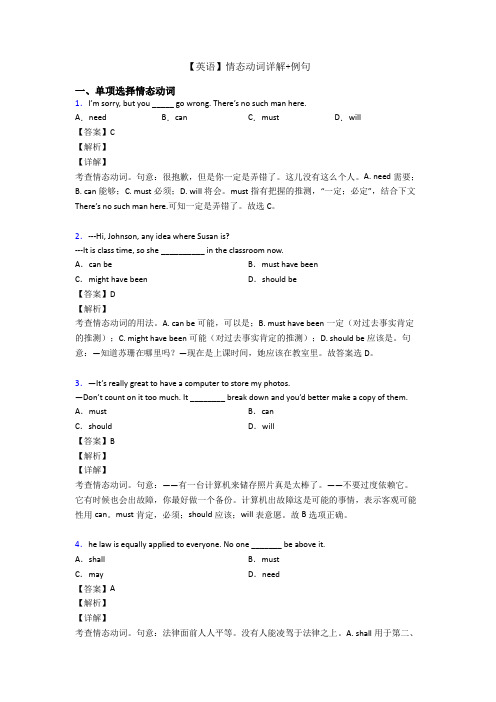
You ought to / should have studied harder.你本应该更努力学习的.(但没有)
【答案】D
【解析】
考查情态动词的用法。A. can be可能,可以是;B. must have been一定(对过去事实肯定的推测);C. might have been可能(对过去事实肯定的推测);D. should be应该是。句意:—知道苏珊在哪里吗?—现在是上课时间,她应该在教室里。故答案选D。
C.willD.must
【答案】A
【解析】
【详解】
考查情态动词词义辨析。A. shall用于法律法规或条文中,表示义务、规定等;B. need需要;C. will会;D. must必须。句意:——我能用信用卡支付么?——对不起,先生,现金支付是我们酒店的管理规定。故A项正确。
8.The weather turned out to be fine. I _____________ the trouble to carry the umbrella with me.
【答案】C
【解析】
考查虚拟语气。——我们上周种的小树怎么了?——这些小树本来会长得很好,但是我们没有给它们浇水。根据语境可知,此处是对过去的事实进行假设,故本题选C。
6.It_____ have been Tom that parked the car here, as he is the only one with a car.
A.mustB.canC.shallD.should
初二下情态动词用法
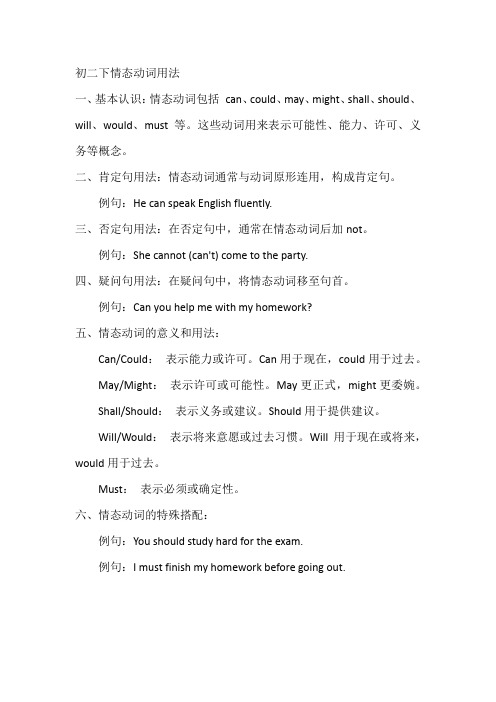
初二下情态动词用法
一、基本认识:情态动词包括can、could、may、might、shall、should、will、would、must等。
这些动词用来表示可能性、能力、许可、义务等概念。
二、肯定句用法:情态动词通常与动词原形连用,构成肯定句。
例句:He can speak English fluently.
三、否定句用法:在否定句中,通常在情态动词后加not。
例句:She cannot (can't) come to the party.
四、疑问句用法:在疑问句中,将情态动词移至句首。
例句:Can you help me with my homework?
五、情态动词的意义和用法:
Can/Could:表示能力或许可。
Can用于现在,could用于过去。
May/Might:表示许可或可能性。
May更正式,might更委婉。
Shall/Should:表示义务或建议。
Should用于提供建议。
Will/Would:表示将来意愿或过去习惯。
Will用于现在或将来,would用于过去。
Must:表示必须或确定性。
六、情态动词的特殊搭配:
例句:You should study hard for the exam.
例句:I must finish my homework before going out.。
【英语】情态动词
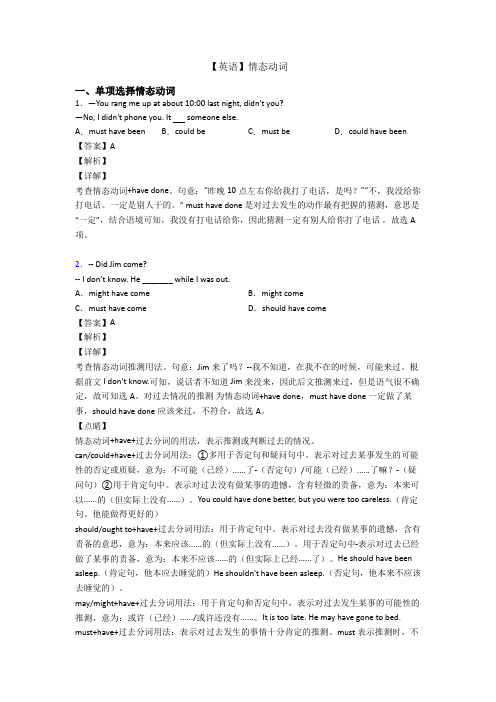
【英语】情态动词一、单项选择情态动词1.—You rang me up at about 10:00 last night, didn't you?—No, I didn't phone you. It someone else.A.must have been B.could be C.must be D.could have been 【答案】A【解析】【详解】考查情态动词+have done。
句意:“昨晚10点左右你给我打了电话,是吗?”“不,我没给你打电话。
一定是别人干的。
” must have done 是对过去发生的动作最有把握的猜测,意思是“一定”,结合语境可知,我没有打电话给你,因此猜测一定有别人给你打了电话。
故选A 项。
2.-- Did Jim come?-- I don’t know. He _______ while I was out.A.might have come B.might comeC.must have come D.should have come【答案】A【解析】【详解】考查情态动词推测用法。
句意:Jim来了吗?--我不知道,在我不在的时候,可能来过。
根据前文I don’t know.可知,说话者不知道Jim来没来,因此后文推测来过,但是语气很不确定,故可知选A。
对过去情况的推测为情态动词+have done,must have done 一定做了某事,should have done 应该来过,不符合,故选A。
【点睛】情态动词+have+过去分词的用法,表示推测或判断过去的情况。
can/could+have+过去分词用法:①多用于否定句和疑问句中。
表示对过去某事发生的可能性的否定或质疑,意为:不可能(已经)......了-(否定句)/可能(已经)......了嘛?-(疑问句)②用于肯定句中。
表示对过去没有做某事的遗憾,含有轻微的责备,意为:本来可以......的(但实际上没有......)。
情态动词及用法
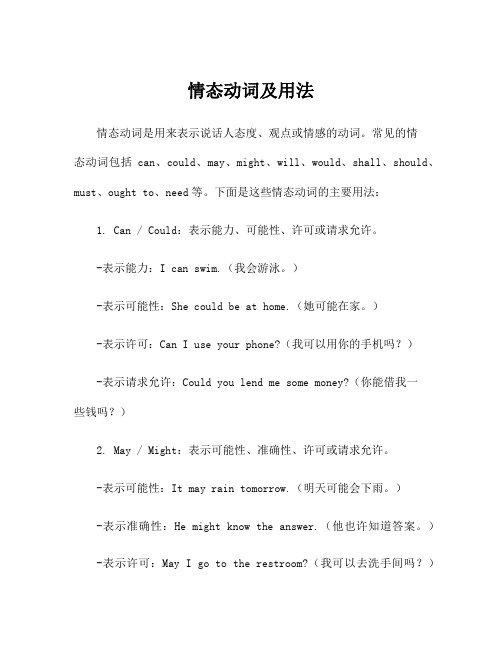
情态动词及用法情态动词是用来表示说话人态度、观点或情感的动词。
常见的情态动词包括can、could、may、might、will、would、shall、should、must、ought to、need等。
下面是这些情态动词的主要用法:1. Can / Could:表示能力、可能性、许可或请求允许。
-表示能力:I can swim.(我会游泳。
)-表示可能性:She could be at home.(她可能在家。
)-表示许可:Can I use your phone?(我可以用你的手机吗?)-表示请求允许:Could you lend me some money?(你能借我一些钱吗?)2. May / Might:表示可能性、准确性、许可或请求允许。
-表示可能性:It may rain tomorrow.(明天可能会下雨。
)-表示准确性:He might know the answer.(他也许知道答案。
)-表示许可:May I go to the restroom?(我可以去洗手间吗?)-表示请求允许:Might I borrow your pen?(我可以借用你的笔吗?)3. Will / Would:表示意愿、习惯、请求、承诺或预测。
-表示意愿:I will help you.(我愿意帮助你。
)-表示习惯:She would always go for a walk after dinner.(她习惯饭后散步。
)-表示请求:Would you please close the door?(请你关上门好吗?)-表示承诺:I would do my best to finish the project.(我会尽力完成这个项目。
)-表示预测:It will rain tomorrow.(明天将会下雨。
)4. Shall / Should:表示建议、命令、义务或预测。
-表示建议:You should exercise regularly.(你应该经常运动。
10个重要情态动词用法详解

1. can⑴ 表示能力,一般译为“能、会”,尤其指生来具备的能力。
如:She can swim fast, but I can’t .⑵ 表示许可,常在口语中。
如: Youcanuse my dictionary.⑶表示推测,意为“可能”,常用于否定句和疑问句中,此时 can’t 译为“不可能”。
如:—Can the news be true? — No, it can’t be our teacher. He is on a visit to the Great Wal l.2. could⑴ can 的过去式,意为“能、会”,表示过去的能力。
如: He could write poems when he was 10.⑵ could 在疑问句中,表示委婉请求的语气,此时 could 没有过去式的意思。
如:Could you do me a favour?—Could I use your pen? —Yes, youcan. (注意回答)3. may⑴ 表示请求、许可,比 can 正式,如: May I borrow your bike? Youmay gohomenow.⑵ 表示推测,谈论可能性,意为“可能,或许”,一般用于肯定句中。
如: Itmay raintomorrow . Shemay be at home.⑶ may 的过去式为 might。
might 也可以表示可能性低于 may (此时 might 没有过去式的意思)。
如: He is away from school. He might be sick.⑷ 表示希望、祈求、祝愿,常可译为“祝愿”。
通常是用 may +主+V如: May you have a good time.May you be happy!May you succeed !4. must⑴ must 表示主观看法,意为“必须”。
如: You must stay here until I come back.Must I hand in my homework right now?⑵对 must 引导的疑问句,肯定回答为 must,否定回答为 needn’t 或 don’t have to .如:— Must I finish my homework? —No, you needn’t.⑶ must 也可以表示有把握的推测,意为“ 一定,肯定”,用于肯定句。
情态动词造句
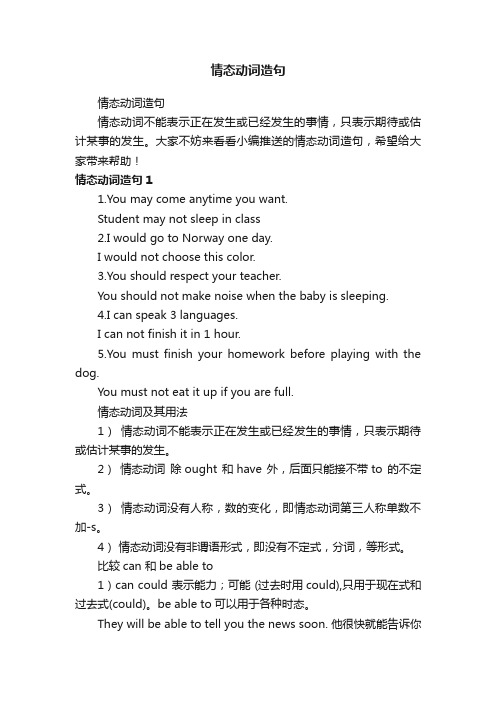
情态动词造句情态动词造句情态动词不能表示正在发生或已经发生的事情,只表示期待或估计某事的发生。
大家不妨来看看小编推送的情态动词造句,希望给大家带来帮助!情态动词造句11.You may come anytime you want.Student may not sleep in class2.I would go to Norway one day.I would not choose this color.3.You should respect your teacher.You should not make noise when the baby is sleeping.4.I can speak 3 languages.I can not finish it in 1 hour.5.You must finish your homework before playing with the dog.You must not eat it up if you are full.情态动词及其用法1)情态动词不能表示正在发生或已经发生的事情,只表示期待或估计某事的发生。
2)情态动词除ought 和have 外,后面只能接不带to 的不定式。
3)情态动词没有人称,数的变化,即情态动词第三人称单数不加-s。
4)情态动词没有非谓语形式,即没有不定式,分词,等形式。
比较can 和be able to1)can could 表示能力;可能 (过去时用could),只用于现在式和过去式(could)。
be able to可以用于各种时态。
They will be able to tell you the news soon. 他很快就能告诉你消息了。
2)只用be able toa. 位于助动词后。
b. 情态动词后。
c. 表示过去某时刻动作时。
d. 用于句首表示条件。
e. 表示成功地做了某事时,只能用was/were able to,不能用could。
情态动词在高考中的用法
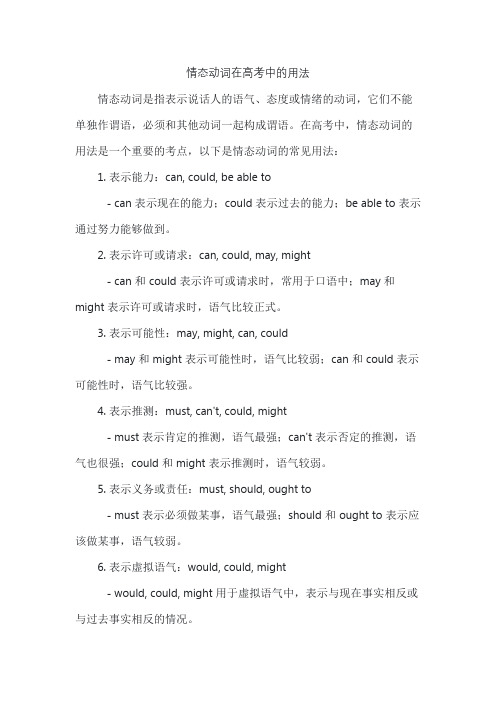
情态动词在高考中的用法
情态动词是指表示说话人的语气、态度或情绪的动词,它们不能单独作谓语,必须和其他动词一起构成谓语。
在高考中,情态动词的用法是一个重要的考点,以下是情态动词的常见用法:
1. 表示能力:can, could, be able to
- can 表示现在的能力;could 表示过去的能力;be able to 表示通过努力能够做到。
2. 表示许可或请求:can, could, may, might
- can 和 could 表示许可或请求时,常用于口语中;may 和might 表示许可或请求时,语气比较正式。
3. 表示可能性:may, might, can, could
- may 和 might 表示可能性时,语气比较弱;can 和 could 表示可能性时,语气比较强。
4. 表示推测:must, can't, could, might
- must 表示肯定的推测,语气最强;can't 表示否定的推测,语气也很强;could 和 might 表示推测时,语气较弱。
5. 表示义务或责任:must, should, ought to
- must 表示必须做某事,语气最强;should 和 ought to 表示应该做某事,语气较弱。
6. 表示虚拟语气:would, could, might
- would, could, might 用于虚拟语气中,表示与现在事实相反或与过去事实相反的情况。
在高考中,情态动词的用法需要根据具体的语境来判断,因此需要考生具备较强的语言理解能力和运用能力。
同时,考生还需要注意情态动词的时态和语态等方面的变化,以确保答案的准确性。
初中情态动词最全讲解,从此不再害怕情态动词(值得收藏)

初中情态动词最全讲解,从此不再害怕情态动词(值得收藏)一.情态动词的用法(必须掌握)1. can 用法1)表示能力,与be able to同义,但can只用于现在时和过去时,be able to可用于各种时态。
Two eyes can see more than one.注:Can you … ? Yes, I can / No,I can’t.2).表示允许、请求用could比can 语气更加委婉客气,常用于could I /you …..?句型中,若表示同意时,用can回答而不用could .Could I borrow the book ? No, you can’t .3)。
表示推测“可能”常用于否定句或疑问句中。
(can’t表示一定不是)It can’t be true .Can it be true ?2. may 用法1)表允许,请求= can表示许可或征求对方的许可,常于第一人称连用。
注:May I ….? Yes ,you may No, you can’t / mustn’t .在回答以may引起的问句时,多避免用这个词,而用其它方式,如Yes, please. / Certainly.2)表推测,可能、也许。
常用于肯定句中。
Maybe he knows the news .=He _____ _____ the news.3. must1)表示义务。
意为“必须”(主观意志)。
We must do everything step by step.注:Must I ….? Yes, you must / No,you needn’t(don’t have to ).--Must we hand in our exercise—books now?--No, you needn’t. / No, you don’t have to.2)mustn’t 表禁止、不允许。
You mustn’t talk to her like that.3)表示揣测。
【精品】情态动词详解+例句

精品】情态动词详解 +例句一、单项选择情态动词1.Traveling by subway ___ s ometimes be quite an adventure, especially during the rush hour.C . shouldn't have been【答案】 D【解析】D . couldn't have been详解】 考查情态动词表推测。
句意:很多公司现在使用人工智能进行试验,这在几年前是不可能 的。
根据“a few years age 可知,此处表示 过去不可能”应该用couldn ' t have done 故D 项正确。
3.Mr. Baker, some students want to see you. they wait here or outside? A . MayB .ShouldC .ShallD .Will【答案】 C 解析】详解】 考查 Shall 的用法。
句意:贝克先生,有些学生想见你。
他们是在这里等还是在外面 等?Shall 用于第一、第三人称疑问句中,表示说话人征求对方的意见或向对方请示。
故选C 。
点睛】Shall 的用法Shall 作为助动词,一般用于第一人称 I 和We ,表示一个将来的动作,构成将来时态。
Shall 后面接动词原形。
例如:(1)I shall think it over and Let you know my idea. 我将考虑一下此事,然后告诉你我的想 法。
(2)We shall have a good time in the park. 我们在公园里会玩得很高兴的。
常考的特殊用法1. Shall 用于第一人称,表示征求对方的意愿。
如:A . must 【答案】B B .canC .shallD .should解析】 详解】 考查情态动词。
句意:乘地铁旅行有时可能相当冒险,尤其是在交通高峰期。
高中英语情态动词详细讲解及例句
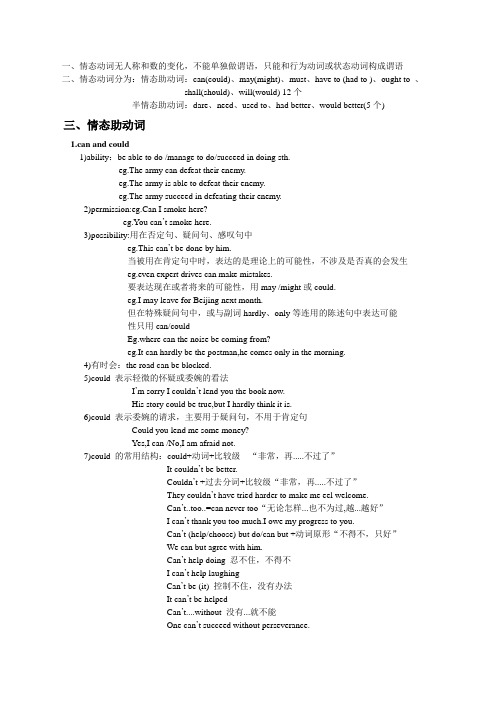
一、情态动词无人称和数的变化,不能单独做谓语,只能和行为动词或状态动词构成谓语二、情态动词分为:情态助动词:can(could)、may(might)、must、have to (had to )、ought to 、shall(should)、will(would) 12个半情态助动词:dare、need、used to、had better、would better(5个)三、情态助动词1.can and could1)ability:be able to do /manage to do/succeed in doing sth.eg.The army can defeat their enemy.eg.The army is able to defeat their enemy.eg.The army succeed in defeating their enemy.2)permission:eg.Can I smoke here?eg.You can’t smoke here.3)possibility:用在否定句、疑问句、感叹句中-eg.This can’t be done by him.当被用在肯定句中时,表达的是理论上的可能性,不涉及是否真的会发生eg.even expert drives can make mistakes.要表达现在或者将来的可能性,用may /might或could.eg.I may leave for Beijing next month.但在特殊疑问句中,或与副词hardly、only等连用的陈述句中表达可能性只用can/couldEg.where can the noise be coming from?eg.It can hardly be the postman,he comes only in the morning.4)有时会:the road can be blocked.5)could 表示轻微的怀疑或委婉的看法I’m sorry I couldn’t lend you the book now.His story could be true,but I hardly think it is.6)could 表示委婉的请求,主要用于疑问句,不用于肯定句Could you lend me some money?Yes,I can /No,I am afraid not.7)could 的常用结构:could+动词+比较级“非常,再.....不过了”It couldn’t be better.Couldn’t +过去分词+比较级“非常,再.....不过了”They couldn’t have tried harder to make me eel welcome.Can’t..too..=can never too“无论怎样...也不为过,越...越好”I can’t thank you too much.I owe my progress to you.Can’t (help/choose) but do/can but +动词原形“不得不,只好”We can but agree with him.Can’t help doing 忍不住,不得不I can’t help laughingCan’t be (it) 控制不住,没有办法It can’t be helpedCan’t....without 没有...就不能One can’t succeed without perseverance.2.may and might1)permission:May I use your pen?Yes,you may./No,you may not.2)Possibility:用于推测,表示不确定,不用于疑问句中She may know Tom’s address.出现I’m afraid.I’m not sure等表示不确定时,常用may/might.I’m afraid he might not come to attend the meeting today.从语气上判断,may表示的可能性比might 大,might更多的表示怀疑He may be very busy now.He might be very busy now.3)用于让步状语从句中However hard you may study,you cannot master English in a month.4)用于祈使句,表示祝愿May you succeed!5)might 常用于表示轻微的责备和委婉的请求You might post the letter for me if you are going near a post box.You might have let me know before!6)习惯用法:may as well do”理所当然,有足够的理由”She may be proud of her sonMay /might (just) as well do=had better do(最好)You might as well stay at home tonight.May/might as well+do A+as+do+B”与其做B不如做A”You might as well throw the money away as lend it to him.One may as well not know a thing at all as know it but imperfectly3.must and have to1)表示义务,一定要,必须You must arrive in good time.The meeting is very important.2)表示肯定性或难以避免,必然会,肯定会All men must die.3)must 表示有把握的推测,一定是,准时Must do/must be doing/must have doneThe tall fellow must be a basketball player.Let’s have something.You must be starving.He must have received mu letter which has mailed last week.4)must 表示非要,偏要,常以第二人称为主语,意指不耐或令人不愉快的事情,用于其他人称,表示主语固执,意为偏偏Why must you buy that car?Jane was never a pleasant young girl.After you gave her your advice,she must goand do the opposite.5)must 的三种否定形式表示不可能must be --can’t be must have done--can’t have doneYou must have met him before.You can’t have met him before.表示不必must do--need not to/don’t have toWe must get up at six tomorrow morning.We don’t have to get up at six tomorrow morning.表示决不能,严禁must--mustn’tYou mustn’t park your car here.6)回答以must提问的句子Must we clean all the rooms?Yes ,you must/No ,you don’t have to/No ,you needn’t7)must 可做名词,表示必须有的东西,必须做的事Warm clothes are a must in the mountains.8)must和have to 表示必须时,有一下差别Must 表示的是说话人主观的看法,而have to则往往强调客观需要The play is not interesting ,I really must go now.I have to work when I was your age.Must 一般只表现在,have to 则有更多的时态。
情态动词的用法总结

情态动词的用法总结情态动词是英语中一类特殊的动词,用来表达说话人对某种行为或状态的态度、观点、意愿、能力等。
它们通常用来修饰其他动词,帮助我们表达说话人的情感色彩或态度。
在英语中,常见的情态动词包括can, could, may, might, must, shall, should, will, would等。
1. 表示能力和可能性:- Can: 表示能力或许可。
例如:“I can swim.(我会游泳。
)”- Could: 表示过去的能力或许可,也用于礼貌地提出请求。
例如:“Could you help me?(你能帮我吗?)”- May: 表示许可或可能性。
例如:“May I go home now?(我现在可以回家吗?)”- Might: 表示过去可能性或委婉的请求。
例如:“Might I ask a question?(我可以问一个问题吗?)”2. 表示推测和猜测:- Must: 表示肯定的推测或必然性。
例如:“Tom must be at home.(汤姆一定在家。
)”- Might/Could: 表示可能性或推测。
例如:“He might be late.(他可能会迟到。
)”3. 表示义务和责任:- Must: 表示必须或应该做某事的义务。
例如:“I must finish my homework.(我必须完成我的作业。
)”- Should: 表示应该或建议做某事。
例如:“You should apologize.(你应该道歉。
)”4. 表示愿望和目的:- Will: 表示意愿、决心或打算。
例如:“I will help you.(我会帮助你。
)”- Would: 表示客气的请求或愿望。
例如:“Would you like some tea?(你想喝点茶吗?)”需要注意的是,情态动词本身没有人称或数的变化,也不具备时态的变化。
它们以不完全动词的形式出现,并且后面接原形动词。
除了以上常见的情态动词,还有一些其他的情态动词,如ought to, used to等。
(完整版)情态动词知识点总结

(完整版)情态动词知识点总结什么是情态动词情态动词(Modal verb)是一种特殊的动词形式,用来表示说话人对某种行为、情况或可能性的态度、观点、意愿、能力等。
情态动词可以用来构成陈述句、疑问句、否定句、建议句等。
常用的情态动词及其用法1. Can:表示能力、许可、可能性、请求等。
Can:表示能力、许可、可能性、请求等。
- 表示能力:I can swim.(我会游泳。
)- 表示许可:Can I use your phone?(我可以用一下你的手机吗?)- 表示可能性:He can be late.(他可能会迟到。
)- 表示请求:Can you help me?(你能帮我吗?)2. Could:表示过去的能力、请求、建议等。
Could:表示过去的能力、请求、建议等。
- 表示过去的能力:When I was young, I could run faster.(我年轻的时候,跑得更快。
)- 表示请求:Could you please pass me the salt?(你能给我递一下盐吗?)- 表示建议:You could try using a different approach.(你可以尝试用一种不同的方法。
)3. May:表示可能性、许可、祝愿等。
May:表示可能性、许可、祝愿等。
- 表示可能性:It may rain tomorrow.(明天可能会下雨。
)- 表示许可:May I use your bathroom?(我可以使用你的卫生间吗?)- 表示祝愿:May you have a happy birthday!(祝你生日快乐!)4. Might:表示可能性、建议、推测等。
Might:表示可能性、建议、推测等。
- 表示可能性:She might be at home.(她可能在家。
)- 表示建议:You might want to consider another option.(你可以考虑另一个选项。
- 1、下载文档前请自行甄别文档内容的完整性,平台不提供额外的编辑、内容补充、找答案等附加服务。
- 2、"仅部分预览"的文档,不可在线预览部分如存在完整性等问题,可反馈申请退款(可完整预览的文档不适用该条件!)。
- 3、如文档侵犯您的权益,请联系客服反馈,我们会尽快为您处理(人工客服工作时间:9:00-18:30)。
A.can’tB.mustn’t
C.needn’tD.wouldn’t
【答案】A
【解析】
【详解】
考查情态动词。句意:——劳驾,你能告诉我最近的Wenfeng Supermarket怎么走吗?——好的,一直往前走两个街区就到了。你不会错过的。A. can’t不可能;B. mustn’t禁止,不允许;C. needn’t不必;D. wouldn’t不会。故选A。
【英语】情态动词详解+例句
一、单项选择情态动词
1.—Where is my dictionary?I remember I put it here yesterday.
—You___it in the wrong place.
A.must putB.should have put
C.might putD.might have put
【答案】D
【解析】
【详解】
考查情态动词。句意:——我的词典在哪里?我记得昨天放在这里了。——你或许放错了地方。“might have +动词+ed形式”表示过去可能完成的动作。根据所提供的情景Where is my dictionary? I remember I put it here yesterday.可判断出把词典放在某个地方发生在过去,所以要用“might have +动词+ed形式”。“should have +动词+ed形式”表示“(过去)本来应该做某事”。must意为“一定”,是肯定的推测,与所提供的情景的矛盾。might put表示现在发生的事。故选D。
C.willD.must
【答案】A
【解析】
【详解】
考查情态动词词义辨析。A. shall用于法律法规或条文中,表示义务、规定等;B. need需要;C. will会;D. must必须。句意:——我能用信用卡支付么?——对不起,先生,现金支付是我们酒店的管理规定。故A项正确。
9.— Excuse me, could you please tell me how to get to the nearest Wenfeng Supermarket?
【答案】D
【解析】
【详解】
考查情态动词。句意:——我有重要的事情要告诉John,但是我找不到他。——他的手机在这儿,所以他不可能走得太远。根据句意可知,此处是对过去的一种猜测,此处是表达不可能……,用can’t have done。故选D。
3.The room is so clean. He ________ have cleaned it yesterday evening.
10.—I saw your uncle take a taxi to the airport. Why didn’t you drive him there?
8.---Can I pay the bill by credit card?
---Sorry, sir. But it is the management rules of our hotel that payment ______________ be made in cash.
A.shallB.need
7.Mark ______ have hurried. After driving at top speed, he arrived half an hour early.
A.needn’tB.wouldn’tC.mustn’tD.couldn’t
【答案】A
【解析】
考查情态动词。need’t have done本不必要做某事,句意:迈克本不必要着急的。他以全速驾驶后,他早到了半个小时。wouldn’t不会,mustn’t禁止,couldn’t不可能,所以选A。
2.—I have something important to tell John. But I can’t find him.
—His cell phone is here, so he ________ have gone too far.
A.mustn’tB.needn’t
C.wouldn’tD.can’t
A.should theyB.they should
C.dare theyD.they dare
【答案】A
【解析】
【详解】
考查部分倒装和情态动词。句意:这位教授警告学生们,在他的课堂上,决不应该使用手机。on no account意为“决不”,否定词放在句首,句子使用部分倒装,排除B、D项;这里表示应该,故选A。
6.kened immunity and memory, and also slow physical growth.
A.shallB.mustC.shouldD.can
【答案】D
【解析】
【详解】
考查情态动词辨析。句意:睡眠不足会导致免疫力和记忆力下降,还会减缓身体发育。A. shall将;B. must必须;C. should应该;D. can会,表示理论上或是逻辑判断上,用can,故选D。
A.mightB.could
C.shallD.will
【答案】C
【解析】
【详解】
考查情态动词辨析。句意:我们其中一条规则要求每个学生在校期间都要穿校服。shall可以表示“命令,警告,强制要求;允诺;法律,规定要做……”,结合句意可知C正确。
5.The professor warned the students that on no account ________ use mobile phones in his class.
A.willB.need
C.canD.must
【答案】D
【解析】
【详解】
考查情态动词表推测。句意:房间如此干净,他一定是昨天晚上打扫过了。must have done表示对过去发生的事情有把握的猜测,意思是“一定(做过)”,故D项正确。
4.One of our rules is that every student _______ wear school uniform while at school.
